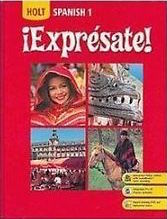
All Solutions
Page 146: Preparate para el examen
Tengo…,…,… – I have….
¿Cuál es tu materia preferida? – which is your favourite class?
Bueno, me gusta… porque es… Y tú, ¿cuál es tu materia preferida? –
Well,I like… because it is… And you, which one is yours?
Es… Bueno, ¿qué necesitas para la clase de inglés? – It is… And what do you need for English class?
Necesito… –I need…
2. matemáticas
3. computación
4. la computación
5. contemporánea
6. matemáticas
7. un cuaderno
8. un diccionario
¿Generalmente tienen prisa ustedes cuando vienen al colegio? – are you usually in a hurry when you go to school?
¿Cuántas clases tienes en un día? –how many classes do you have in a day?
¿Necesitas muchas cosas para las clases? – do you need a lot of things for classes?
¿Qué cosas necesitas para la clase de español? – what do you need for Spanish class?
¿Qué tienes que hacer después de clases ? – what do you need to do after classes?
¿Qué tienes ganas de hacer este fin de semana? ¿Y tu mejor amigo(a)? – what would you like to do this weekend? And your best friend?
2.) Normalmente venimos más temprano, para tomar un café, así que no tenemos prisa.
3.) Depende del día, pero normalmente tenemos 5 clases cada día.
4.) Para la mayoría de las clases solamente necesito mis cuadernos y libros. A veces necesito mi computadora.
5.) Para la clase del español necesito mi cuaderno, libro y algunos diccionarios.
6.) Después de cada clase tengo que tomar otros libros de mi taquilla y prepararme para la próxima clase.
7.) Este fin de semana quiero ir al cine con mis amigos, hacemos muchas cosas juntos.
In picture B we cam see a football game.
In picture C we can see a concert.
In picture D we can see a girl in a restaurant.
¿Quieres ir a ver futból este Jueves? – No, ya tengo planes con mi hermano, vamos al cine.
¿Qué te parece si vamos mañana al concierto en el auditorio? – Sí, claro, me gusta ir a los conciertos.
¿Vamos a un restaurante para la cena? – No, prefiero quedarme en casa, estoy muy cansada.
¿Ves televisión los sábados? – do you watch TV on Saturdays
¿Va a venir un amigo a tu casa el domingo? – will your friend come over on Sunday
¿Van a hacer la tarea en casa tu amigo y tú? – will you and your friend do homework
¿Vas a ir a un partido de béisbol el sábado? – will you go to a baseball game this Saturday
¿Sales mucho con amigos los viernes? – do you often go out with your friends on Fridays
¿Sales a comer comida china los domingos? – do you eat chinese food on Sundays
Los sábados veo la televisión si no salgo con mis amigos.
El domingo mis amigos no van a venir a mi casa porque nos vamos a un concierto.
Mi amigo y yo vamos a hacer la tarea juntos en mi casa.
El sábado no vamos a ir al cine porque decidimos quedarnos en casa.
Los viernes a menudo salimos después de las clases.
Los domingos a veces voy a comer la comida china con mi familia, nos gusta mucho este tipo de comida.
PARTNER B: Hola, estoy muy bien, ¿y tú? Hoy tengo solamente las matemáticas, el arte y la física.
PARTNER A: ¿Quieres ir al centro comercial después de las clases?
PARTNER B: Sí, claro, tengo que comprar muchas cosas en la librería.
PARTNER A: Sí, yo tambien tengo que comprar muchas cosas. Y, ¿cuándo vas a hacer tu tarea?
PARTNER B: Voy a hacer mi tarea por la noche. ¿Qué vas a hacer mañana?
PARTNER A: Mañana voy a un partido de fútbol en el parque. ¿Quieres ir conmigo?
PARTNER B: Sí, gracias! Me gustaría muchísimo, no he ido a ningún partido en meses. Nos vemos mañana en el parque.

